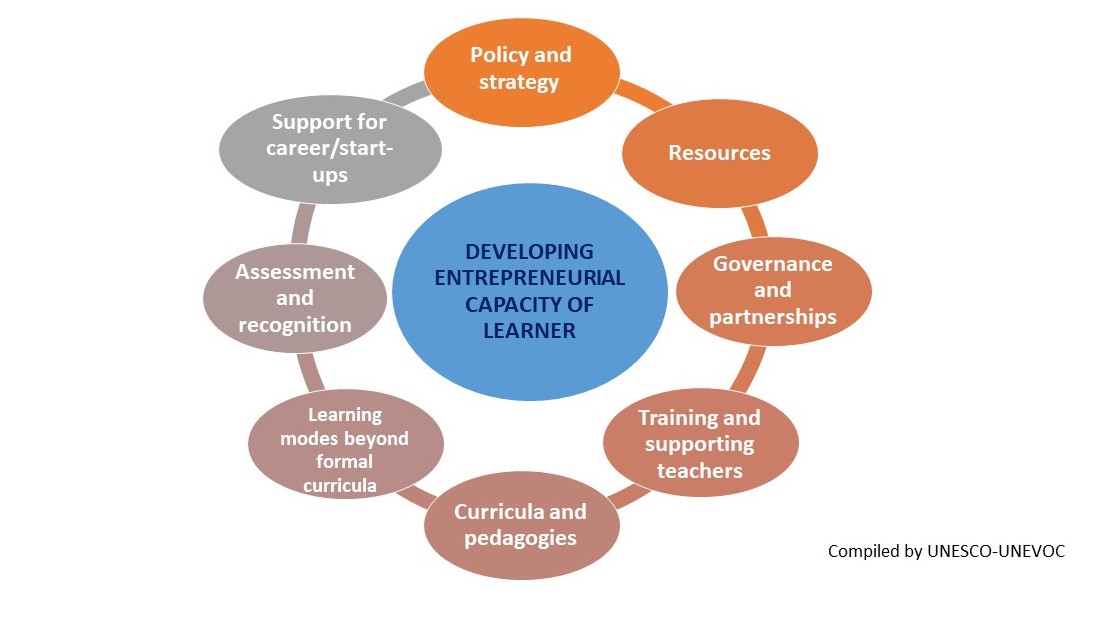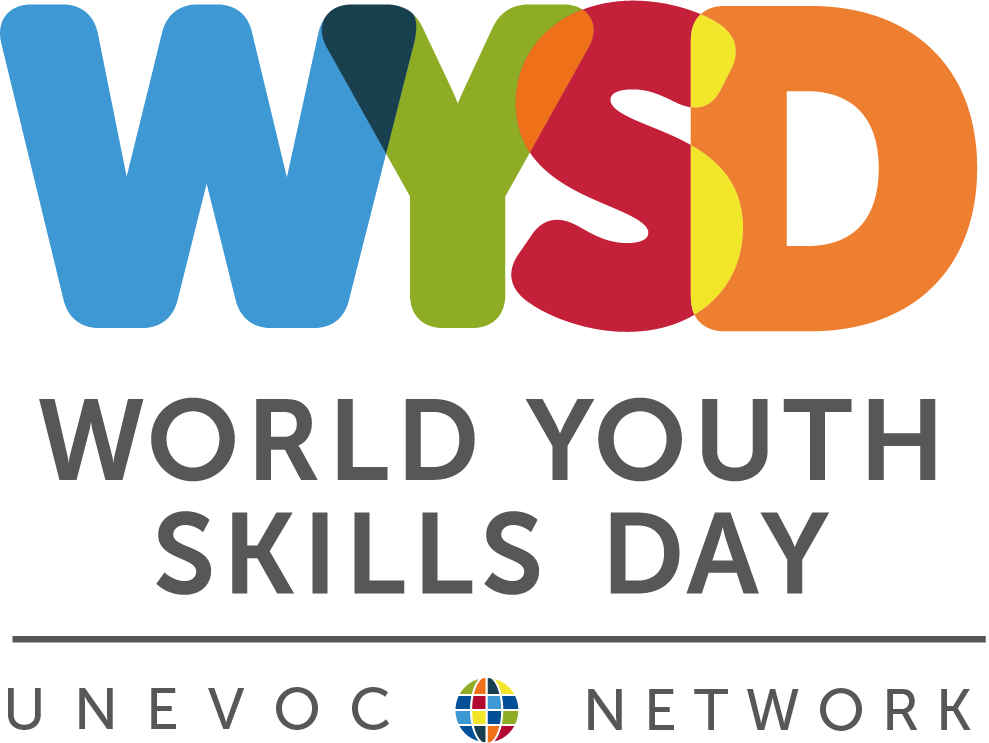
The UNESCO-UNEVOC International Centre: Who We Are | What We Do | Working With Us | Get in Touch
The UNEVOC Network: Learn About the Network | UNEVOC Network Directory
For Members: UNEVOC Centre Dashboard
Thematic Areas: Inclusion and Youth | Digital Transformation | Private Sector Engagement | SDGs and Greening TVET
Our Key Programmes & Projects: BILT: Bridging Innovation and Learning in TVET | Building TVET resilience | TVET Leadership Programme | WYSD: World Youth Skills Day
Past Activities: COVID-19 response | i-hubs project | TVET Global Forums | Virtual Conferences | YEM Knowledge Portal
Our Services & Resources: Publications | TVET Forum | TVET Country Profiles | TVETipedia Glossary | Innovative and Promising Practices | Toolkits for TVET Providers | Entrepreneurial Learning Guide
Events: Major TVET Events | UNEVOC Network News

By 2030, as the global population is expected to reach 8.6 billion, the youth population will increase to more than 1.3 billion (UN DESA![]() ). Pervasive unemployment, underemployment and longer school- to-work transitions are some of the most significant challenges facing the rising youth population. These challenges are the result of the lack of adequate professional opportunities for young people, and increasingly skewed skills imbalances, i.e. shortages, surpluses and mismatch of skills acquired versus those demanded by the world of work.
). Pervasive unemployment, underemployment and longer school- to-work transitions are some of the most significant challenges facing the rising youth population. These challenges are the result of the lack of adequate professional opportunities for young people, and increasingly skewed skills imbalances, i.e. shortages, surpluses and mismatch of skills acquired versus those demanded by the world of work.
To cope with evolving skills demands, technical and vocational education and training (TVET) systems are investing in new learning pathways, setting-up innovative initiatives and programmes, and developing new partnerships. Responsive skills development programmes need to ensure not only the functional consistency with the demands from the world of work, but also the development of transversal skills and competences that enable youth to respond to changing industry demands.
267 million young people (aged 15-24) are not in employment, education or training (NEET), and many more endure substandard working conditions (ILO 2020![]() ). In the wake of technological, environmental and demographic shifts, the challenge of creating jobs and livelihood opportunities is immense. However, creating job opportunities without responsive skills development of the youth for the world of work will exacerbate the skills mismatch and yield limited effects.
). In the wake of technological, environmental and demographic shifts, the challenge of creating jobs and livelihood opportunities is immense. However, creating job opportunities without responsive skills development of the youth for the world of work will exacerbate the skills mismatch and yield limited effects.
TVET systems around the world are currently in a state of transformation and innovation to better respond to current and emerging challenges. This transformation, though varied across regions and levels of development, includes the transition of TVET from a vehicle for functional skills development for employability to the development of broad-based and transversal skills that enable its graduates to access further opportunities for learning and upskilling throughout the course of their lives. As transversal skill demands continue to evolve, TVET provides a pathway for young people to develop their competences and transition to the world of work.
Entrepreneurial learning offers a realistic and achievable means to develop the transferable skills that society and the labour market expect of today’s citizens. Recognizing the important role that entrepreneurship can play in countering the challenges of youth employment, UNESCO-UNEVOC has made a concerted effort to promote entrepreneurial learning across the TVET sector.

UNESCO-UNEVOC has been coordinating consultations on entrepreneurial learning in TVET with UNEVOC Centres and other experts from around the world. These consultations explored the current state of entrepreneurial learning in TVET policies and programmes, and facilitated the exchange of experiences, opportunities and challenges to mainstreaming entrepreneurial learning in TVET systems. In November 2018, UNESCO-UNEVOC organized a two-week virtual conference on ‘Entrepreneurial Learning in TVET’, which enabled TVET stakeholders from more than 83 countries to share their approaches and insights on the topic. The main findings were compiled in a virtual conference report and a selection of the practical cases have been included in a discussion paper.
UNESCO-UNEVOC has developed a practical guide that aims to support TVET actors in mainstreaming entrepreneurial learning at the institutional level, taking into account different socio-economic contexts. The overall objective is to contribute to strengthening the capacity of the TVET sector to help prepare young people for the changing world of work and for personal development. The practical guide also provides a step-by-step Entrepreneurial Learning Institution Canvas (ELIC) that TVET administrators, managers and teaching staff can implement at their institutions to foster an 'entrepreneurial culture'. The ELIC tool allows TVET institutions to develop their own concept for entrepreneurial learning, map out which entrepreneurial learning activities are relevant to their institutional context and apply innovative approaches and models.
Access the interactive practical guide
A practical guide
This guide is also available in an [https://unevoc.unesco.org/elg interactive online version]. You can view an introductory video on the practical guide [https://youtu.be/tuY58QuidMg here].
Technical and vocational education and training (TVET) in ...

Every year on July 15, UNESCO-UNEVOC joins global celebrations to mark World Youth Skills Day (WYSD) and spread awareness about the importance of youth skills development. Designated by the United Nations General Assembly, the day is an opportunity to highlight the achievements of young people who have benefitted from skills training and call for increased access to quality training and skills development for youth around the globe. Read more about UNESCO-UNEVOC’s activities to promote WYSD here.
Empowering youth for a sustainable future
Technological advancements and shifting labour market dynamics increasingly call for agile and adaptable skillsets. It is crucial that we empower young people to navigate these changes effectively. Technical and vocational education and training (TVE ...
This report is written in partnership with the Global Student Forum to help you learn about the youth perspective on the different roles and impact of non-state actors in education. For many, a discussion on the role of non-state actors in educatio ...
Due to its close links to the labour market, technical and vocational education and training (TVET) can play an important role to improve job opportunities and livelihoods for young people, and in particular for disadvantaged youth. However, this pot ...
A practical guide
This guide is also available in an [https://unevoc.unesco.org/elg interactive online version]. You can view an introductory video on the practical guide [https://youtu.be/tuY58QuidMg here].
Technical and vocational education and training (TVET) in ...